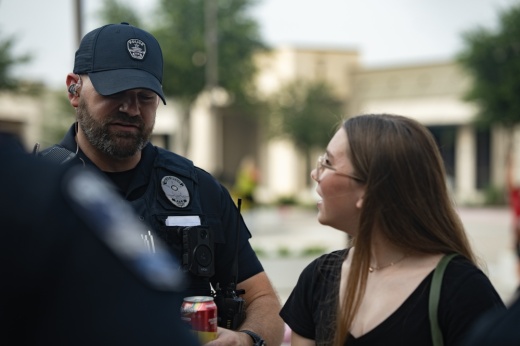The National Alliance on Mental Illness, or NAMI, revealed that more than half of Texas adults with a mental health condition did not receive treatment in 2020. Mental health leaders said that although legislation has since improved access, significant gaps remain.
Across the region, Crisis Intervention Teams, or CIT, and mental health units are being embedded in police departments. Some counties are also expanding psychiatric services within jails to help bridge gaps in Texas' mental health system.
The specifics
Mental health organizations across Central Texas agree on the main barriers to care: affordability, a shortage of providers and health care workers, insurance issues, lack of nearby locations, and long waitlists.
“Texas consistently ranks near the bottom for mental health care access,” said Setareh Ghaznavi, public relations and marketing communications manager at NAMI Central Texas. “According to the Texas Department of State Health Services, 97% of Texas counties are designated as mental health professional shortage areas—that’s 246 out of 254 counties.”
Alison Boleware, director of policy for the Hogg Foundation for Mental Health, said Texas’ rapid population growth has worsened these issues. Many residents struggle to find providers who are available or accept their insurance. While recent state legislation has increased mental health funding, Boleware said inflation and rising demand have limited its impact.
“For the public mental health system that serves uninsured or underinsured individuals, long waitlists, limited access and a lack of available locations are common,” Boleware said. “For people already facing socioeconomic barriers, accessing care can be even more difficult—especially when trying to find a provider who can serve them.”
To help fill these gaps, Crisis Intervention Teams and mental health units in police departments work to divert individuals in crisis from jail to proper care. These teams often respond when someone has been unable to access services before reaching a crisis point. Though not a long-term solution, they are essential tools for Texas communities, according to NAMI leaders.
One in four people with a serious mental illness has been arrested by police, and about two in five adults in jail or prison have a history of mental illness, according to NAMI.
“We're big believers in mental health officers and crisis intervention teams ... in an ideal world, law enforcement officers would not be on the front lines of mental health crises,” said Greg Hansch, executive director of NAMI Texas. “But there are such gaps in the mental health system that it's important law enforcement officers continue to be highly trained—and that there be specialized officers who are singularly focused on responding to mental health crises.”
According to the Texas Commission on Law Enforcement, all peace officers are required to complete de-escalation and crisis intervention training, while officers assigned to mental health roles often receive additional certification through a 40-hour mental health officer course and department-specific field training.
Hays County
Cities including San Marcos, Kyle and Buda have implemented mental health units in their police departments. While each program differs, San Marcos and Kyle offer a close look at how these units work.
In 2023, the San Marcos Police Department, or SMPD, responded to 2,290 calls involving a mental health concern, according to the city’s website. The department’s unit includes a qualified mental health professional, two mental health officers, a corporal and a therapy K-9 officer. A homeless outreach team assists when needed.
According to Corporal Joseph Osborne, a mental health professional joins a mental health officer on crisis calls when there’s a potential risk of danger. If someone meets emergency detention criteria—posing a danger to themselves or others—they’re taken to a hospital or facility. If not, the team connects them to resources or hotlines and may follow up later. If there’s no immediate danger, dispatch may route the call directly to a crisis line instead of sending officers.
A qualified mental health professional joins officers on calls and provides information about local mental health care. Officers then conduct home and follow-up visits with individuals experiencing ongoing crises, aiming to prevent emergencies and reduce repeat calls.
“The important thing to understand is that we're not mental health professionals, but what we really try to work hard at is connecting people to the right resources,” Osborne said.
Kyle’s approach is similar. The Kyle Police Department has a co-response team with a mobile crisis care coordinator and a mental health officer. According to Christine Dalton, one of Kyle’s mobile crisis care coordinators, mental health needs have grown along with the city’s population.
“The idea is to try to provide them with the mental health assistance first, getting them in the right head space and the right care and treatment that they need—prior to handling any sort of criminal offense and putting them in jail, which is the last thing that that we need,” Mental Health Officer Matthew Leathers said. “We usually try to divert from the jail if we can and if possible.”
Travis County
Austin is working to reduce police involvement in mental health crises and expand the role of professionals in these responses. According to previous Community Impact reporting, Austin’s EMS and Mental Health Crisis Response Unit are being considered as alternatives to police intervention. The goal is to bring in law enforcement only when necessary.
This review follows the Austin Police Department’s new mandate requiring all certified patrol officers to undergo training for mental health-related calls. Sgt. Michael King said this ensures a standardized approach.
“We should be the last people you call in a mental health crisis, but when we're needed, we should step up, we should do the right thing, we should handle it correctly, and then we should pass it off to the medical community as quickly as we can,” King said.
The Travis County Sheriff's Office has its own CIT team and focuses on inmate mental health. According to Daniel Smith, director of inpatient mental health programs, up to 40% of inmates receive psychiatric services. But post-release care is often complicated by funding issues and long wait times.
“In Texas, it does make the job harder, especially when we do stabilize somebody and they’re released back into the community and they don’t have funding for continuing their care or the fact that it takes so long to get somebody into care,” Smith said.
Both APD and the sheriff’s office work with Integral Care’s Expanded Mobile Crisis Outreach Team, or EMCOT, to provide co-response services and divert individuals from ERs and jails.
In Pflugerville, the police department has embedded 12 CIT officers across its patrol shifts. In March, the department launched a co-response program in partnership with Integral Care, the local mental health authority. The model pairs a CIT officer with a clinician from Integral Care, allowing them to ride together and respond to mental health calls as a team, according to Chief Jason O’Malley and Lt. Chet Vronka.
The initiative aims to reduce unnecessary transports to jail or emergency rooms.
The department was recently awarded a mental health grant, which will allow for additional staffing and resources. According to O’Malley and Vronka, the grant will fund a full-time clinician, designated bed space at Cross Creek Hospital, and triage training for dispatchers so they can better assess incoming mental health-related calls. In some cases, trained dispatchers may be able to direct individuals to resources without requiring a police response.
Williamson County
Georgetown Police Department has multiple mental health officers but no dedicated in-house unit. Instead, they partner with Bluebonnet Trails, the area’s mental health authority. Bluebonnet clinicians support a co-response approach through ride-alongs, in-field evaluations and post-custody follow-ups, according to Mental Health Officer Keely Wolf. They also help staff Georgetown’s diversion center, created to help individuals avoid jail.
“We're out here trying to solve a problem long-term in a better, more [broad] approach,” Wolf said. “We're just an extra tool in the toolbox for people to help take care of issues and to solve problems.”
Bed space remains limited, especially for those needing acute psychiatric care. Wolf said people sometimes stay in custody longer than necessary because there’s nowhere else to take them.
Georgetown’s crisis team also trains nearby departments on emergency detentions and handling mental health calls with a patient-first mindset.
Williamson County’s sheriff’s office and nearby departments also have crisis-trained officers.
Before you go
If you or someone you know is experiencing a mental health crisis, support is available 24/7:
- 988 Suicide & Crisis Lifeline: Call or text 988
- Hill Country MHDD Crisis Line (Hays County): 1-877-466-0660
- Integral Care Helpline (Travis County): 512-472-HELP (4357)
- Bluebonnet Trails Crisis Line (Williamson County): 1-800-841-1255





